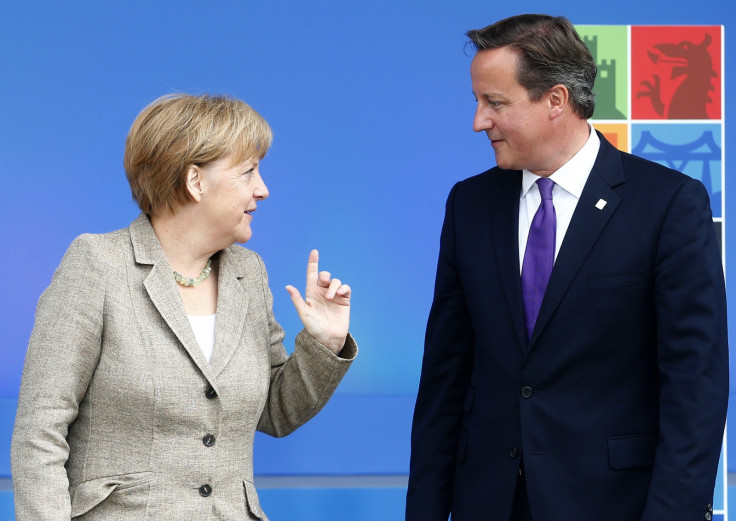Simon Heffer: Angela Merkel underestimates how toxic Europe is for David Cameron's UK voters
With a British general election campaign under way, Europe has at once resurfaced as a key issue in it. David Cameron, the prime minister and leader of a Conservative party under serious threat from the anti-EU Ukip, broke the Christmas political armistice by hinting heavily he might bring forward his proposed referendum on EU membership from 2017 to 2016.
In every sense this appears an intelligent option. Cameron always used to insist on a later option because he said he wanted time for a renegotiation. But it has become patently clear there isn't going to be any such process.

When she visited London almost a year ago and addressed both Houses of Parliament, Angela Merkel was as clear as she could be that Germany, the EU's main paymaster, didn't want to reopen any of the EU's treaties.
And since such a process would require the unanimous participation of all 28 member states, it is almost impossible to imagine it happening.
Many of the more recent entrants to the EU are huge beneficiaries of the organisation. This is either because their nationals migrate in large numbers to richer countries where they find comparatively highly paid work and enjoy the cushion of a benefit system, or because they receive EU funds for industrial, agricultural and infrastructure projects. Christmas may be over but turkeys still don't vote for it.
So it seems that, after a year or two of denial, Cameron has come round to this view and realises there is little point waiting until 2017. Indeed, bringing forward a referendum has other advantages. A shorter waiting period to determine whether or not Britain has a future in Europe will mean a shorter period of instability. Many business leaders have stated clearly that they do not wish Britain to leave the EU, fearing trade would become more difficult and markets would become closed to them.
Others point out the idea of the Germans feeling they had to stop selling BMWs and Audis in Britain, or that the French would stop selling champagne, is utter nonsense. Either way, there will be enormous uncertainty, and the more that is limited, clearly, the better.
Cameron's battle to win back his deserters from Ukip
That is not, of course, the reason why Cameron is dropping this hint. He is keen to staunch not just a haemorrhage of voters, but also of MPs, from his party to Ukip.
Ukip used to be a single issue party – the single issue being a referendum on Britain's continued membership of the EU. But in recent years, it has broadened its platform, picking up policies discarded by the Conservative party (such as academically selective secondary education) or promising a harder line on policies where it detects many in the public think the Conservatives are not conservative enough – notably public spending, where it would cut even more deeply, and defence, which it would have made more of a spending priority.
Cameron hopes that by offering an early referendum, he will tempt some of his deserters back to the Conservative fold.
How all this will play with the UK's European partners remains to be seen. Merkel is due in London on Wednesday (7 January) for more talks with Cameron, in which he is going to seek to persuade her to soften her line on freedom of movement in the EU. The German chancellor is fundamentally opposed to any idea of border restrictions for EU nationals, which is the main point at issue between her and Cameron.

It is also the issue that has made Europe so toxic for many British voters, and has been largely responsible for Ukip's rise in the polls. Merkel does not want the UK to leave the EU. However, if that is the case, she may soon have to understand that Cameron is going to need some scraps to throw to his voters, or they will cease to believe he is serious about representing British interests in the EU.
Either that, or he will be left with no credible basis on which to recommend to the electorate at the time of a referendum that they should vote to stay in, which is currently his position – and he has threatened to fire any minister who refuses to take that line, even though it is believed nine members of his cabinet do.
Also, Philip Hammond, the British foreign secretary, is around halfway through a tour of EU capitals, meeting his counterparts and discussing with them what common ground there might be between the British position – or the position that might allow Cameron to get re-elected when the UK goes to the polls on 7 May – and that of Britain's partners. Sadly for him and Cameron, the lack of shared interests on this question makes the discussions exceptionally difficult.
Of course, Cameron has to win that election before there is any prospect of a referendum. His main Labour opponents have said they will hold one only if there is the prospect of a serious further transfer of sovereignty to Brussels. It may be that Labour underestimates the size of British popular disillusion with the European Union – and it may be that Merkel and her fellow heads of government around the continent underestimate it too.
Dr Simon Heffer is a British commentator and author who has written columns for The Daily Mail, The Daily Telegraph, The Spectator and The New Statesman. He is the biographer of Enoch Powell, Thomas Carlyle and Ralph Vaughan Williams and recently published High Minds: The Victorians And The Birth Of Modern Britain.
© Copyright IBTimes 2025. All rights reserved.






















